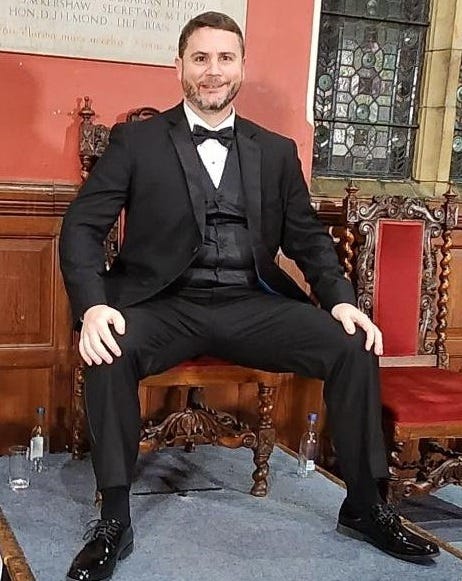James Lindsay imagines that the reality in which we live today is the result of a series of public debates, essentially contests over ideas, the winners of which get to shape the new reality tomorrow. I shall call this The James Lindsay Debate Club Theory of History. Against this I posit, The Academic Agent Power Theory of History, which goes like this: people get into power, whether by force or fraud, and then tell people what they should think which nearly always coincides with actions they have already taken. In this article, I will explore the full ramifications of thinking in my way and rejecting The James Lindsay Debate Club Theory of History.
One of my most controversial ever videos is called Against Ideology (October 2022), where I argued that all ideologies boil down to a simple formula: ‘BS BS, BS BS, therefore I rule’. This was one month after one of my most controversial ever articles, Religion as a Non-Factor in the Fate of Civilizations, which I hope was shown more fully in The Prophets of Doom (2023, buy it now, etc), see particularly the chapter on Peter Turchin, Big Gods, the distinction between The Spark and the Imperial Altar, and what I said in the conclusion which was later expanded into a talk. Of course, neither me nor James Lindsay originated these competing ways of seeing history. This most controversial thesis of mine ultimately comes from the work of Vilfredo Pareto, but I had not fully committed to it at the time of writing The Populist Delusion and somewhat left it hanging in that book. That reasoning is a post-hoc justification for decisions and actions already taken is also suggested strongly by Daniel Kahneman’s Thinking Fast and Slow (2011) and Jonathan Haidt’s The Righteous Mind (2012), two books that have influenced my work for a long time, with each inspiring books by me, namely, Shakespeare and Cognition (2015) and Shakespeare’s Moral Compass (2018). Kahneman and Haidt look at human thought at an individual level; I am saying that what is true on an individual level is also true at a society-wide level. This rests on the assumption that society is a kind of organism, just as one person is an organism — this assumption was shared by almost all the authors I looked at in The Prophets of Doom and, at least implicitly, by Pareto himself.
James Lindsay sitting on the THRONE OF DEBATE at the Oxford Union.
As I’ve suggested, the full consequence of this thesis, which is quite radical and not-very-widely-accepted, is that the history of ideas (the favourite topic of intellectuals everywhere) is much less important than everyone imagines. This matters because a lot of time and energy by fellow travellers – not just James Lindsay, but people much closer to your dear author – is still spent on what is, essentially, intellectual genealogy. Thus, we get competing arguments for how we got here, some of which include:
‘Because of the enlightenment’ (many reactionaries).
‘Because liberalism’ (a variant of the above).
‘Because democracy’ (a variant of the above).
‘Because Christianity’ (a variant of the above).
‘Because leftists have rejected the enlightenment’ (James Lindsay, Jordan Peterson et al).
‘Because Marxism’ (a variant of the above).
‘Because cultural Marxism’ (a variant of the above).
I see most of this discourse on competing ideologies and philosophies as being just noise. I prefer to make discrete and easily measurable claims. Let me share some greatest hits along with my key sources for each of these claims:
‘Laissez-faire free trade’ was a post-hoc rationalisation of control methods which sought to keep the economies of colonies imbalanced and dependent under the British Empire (see Pierre van den Berghe, The Ethnic Phenomenon, 1981).
Margaret Thatcher’s waving about of F.A. Hayek’s books was a post-hoc rationalisation for the final Americanisation of Britain which required the elimination of intermediary institutions that stood between Power and the People and served to accelerate ‘modernisation’ and destroy cultural conservatism (see John Gray, False Dawn, 1998).
Climate change alarmism is a corporate scam which manufactures deindustrialisation and artificial scarcity to generate easy pay days (see James Heartfield, Green Capitalism, 2008).
‘Woke’ is the post-hoc rationalisation of the Civil Rights Regime (see Christopher Caldwell, The Age of Entitlement, 2020).
In each of these cases, it matters not whether the people who carried out the policies in question were true believers or cynical Machiavellians, what matters is that the road taken in each case happened to coincide with the interests of who ruled in each case: the industrialists who ruled the British Empire, the American (or American-style) corporate raiders of Thatcher’s Britain, the same corporate types who have led the climate change nonsense, and the Ellis Island coalition who led the Civil Rights revolution in America. In this final case, data shared by Emil O W Kirkegaard recently shows that by the mid-1960s twenty-five percent of law faculty in America were Jewish. In case you’re wondering, an over-representation of 731% — that high verbal IQ working overtime, and legal fees are very expensive! These legally-minded Jewish elites did not help to institute looser immigration laws and the Civil Rights Regime because they had read John Locke or Michael Foucault or Karl Marx or F.A. Hayek or John Dewey, they did so because of what Pareto would call their sentiments, in other words, their feelings. This need not be anything more sinister than the fact that, as recent immigrants from a minority group, they would feel safer in a more diverse and less homogenous society. This was little more than a non-logical, non-rational feeling rather than a fully reasoned-out policy, which is why today the wisdom of such thinking is severely being questioned by Jews themselves. But the 1960s was back then, before; today, there’s a new mess, and new BS will be generated to justify what those in power feel today. Power does not need to cohere, contradictions are fine, because in the end all power is decisionist and all ideologies are downstream, in the end, from the feelings of those in control right now. Feelings don’t care about your facts!
The James Lindsay Debate Club Theory of History is, however, comforting to many people, especially intellectuals, and especially James Lindsay himself. Why? Let’s turn back to The Populist Delusion:
‘In Pareto’s eyes, there is no difference at all between belief in a classless society and the belief in angels and devils; the end purpose is different, but not the nature of the belief, nor the method of argumentation.’ All that the various arguments and justifications — for what are always, in the final analysis, non-logical faiths — show is that human beings have ‘an inclination towards rationality, not the fact of being rational.’ Pareto maintains that while this is objectively true, humans will never admit it of themselves. (pp. 30-1)
The James Lindsay Debate Club Theory of History indulges the human ‘inclination’, in the end itself a delusion, ‘towards rationality’. This is one reason why it may be useful for Power to select for James Lindsay, as it has already selected for him, Jordan Peterson, Peter Boghossian, Konstantin Kisin, Libs of TikTok, and a whole cavalcade of other BS artists waiting in the wings to justify the next iteration of The Regime in the post-woke world. Power will seldom if ever select for yours truly, ladies and gentlemen, because as Pareto’s English-language editor put it, ‘Truth value and social utility do not necessarily coincide.’ In other words, James Lindsay has a lot more ‘social utility’ than I do because he tells you that the BS matters while I tell you it doesn’t. But this would also be true of anyone peddling any BS – Jesuit priest, Muslim Imam, Buddhist guru, libertarian, socialist, third positionist, whoever – since, where Power is concerned, any BS is better than no BS. Maybe this is why James Burnham, in the end, directly funded and controlled the very BS artists he privately hated, because Burnham – a student of Georges Sorel and a Machiavellian to the last – understood the vital importance of compelling myths in the smooth operation of Power. Burnham was not, as I am, friends, just a scholar.





Bravo, AA!!
Even someone like me, who stongly believes in the ideas as consequence interpretation of history/present, must credit your sharp intellect. Quite persuasive.
As an aside, here’s my top five list of most detested public ‘intellectuals’:
1. Lindsay & Hanania
3. S. Pinker
4. J. Haidt (too many absurd takes — sorry)
5. J. Peterson
*more leftists ones aren’t even worth mentioning.
Bret Weinstein has a theory that societies prosper if their religions offer an evolutionary advantage. ie a collection of behaviours and customs leads to flourishing materially and numerically.